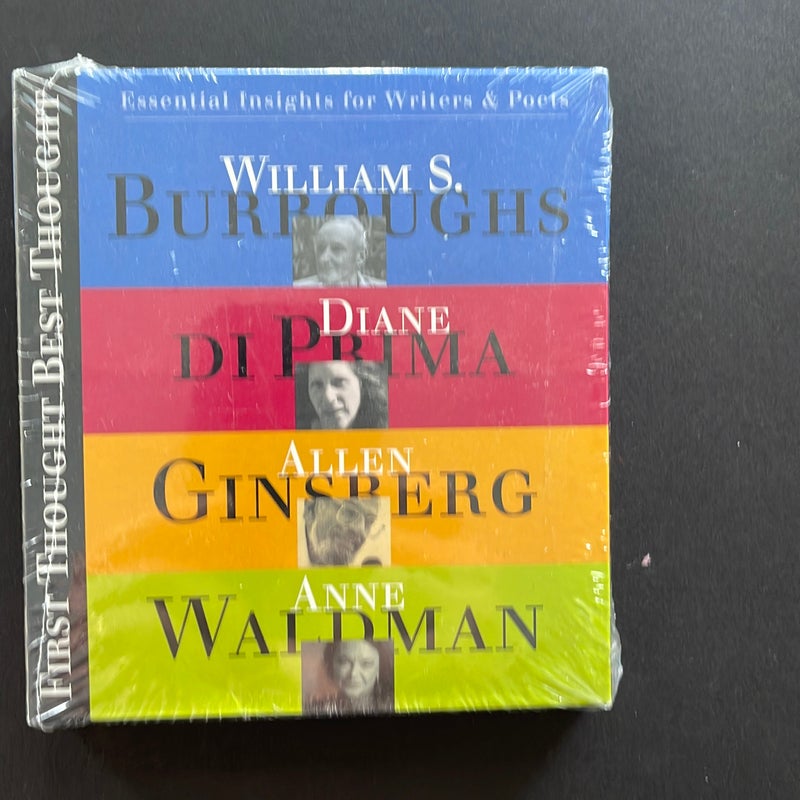
$10.00
Seller Description
4 CDs 5 hours shrink wrapped unopened. First thought, best thought"-that was the phrase that#poet Allen#Ginsberg used to describe spontaneous and fearless writing-a way of "telling the truth" that arises from naked and authentic experience. For more than 30 years, groundbreaking teachers such as Ginsberg and his colleagues Anne Waldman, William S. Burroughs, and Diane di Prima at Naropa University have inspired emerging writers to express themselves with unfettered honesty and immediacy. Now, with First Thought Best Thought, the first-ever release from#Naropa's treasured audio archive, you are to learn with these literary mentors face-to-face as they share the secrets of their craft. About the Author Allen Ginsberg was born in Newark, New Jersey, the son of poet and teacher Louis Ginsberg. In 1948, he received a B.A. degree from Columbia University. Ginsberg began writing poetry while still in school and first gained wide public recognition in 1956 with the long poem Howl. Howl has had a stormy history. When it was first recited at poetry readings, audiences cheered wildly. It was published by Lawrence#Ferlinghetti's City Lights Books and printed in England. Before the printed copies could be distributed, however they were seized by U.S. custom officials as obscene. After a famous court case in which the poem was found not to be obscene, the work sold rapidly and Ginsberg's reputation was assured. Regarded as the foremost port of the Beat generation (as group of rebellious writers who opposed conformity and sough intensity of experience), Ginsberg's work is concerned with many subjects of contemporary interest, including drugs, sexual confusion, the voluntary poverty of the artist and rebel, and rejection of society. He is a poet with a significant message, and his criticism of American society is part of a long tradition of American writers who have questioned their country's values. Ginsberg received numerous honors, including a Woodbury#Poetry Prize, a National Institute of Arts and Letters Award, and a National Book Award for poetry. Ginsberg, ever the Bohemian, had numerous occupations throughout his lifetime including dishwasher, porter, book reviewer, and spot welder. Allen Ginsberg succumbed to cancer in April 1997. 030 From hipster to so-called Godfather of Punk, William Burroughs has lived a controversial life as a leading member of the Beat Generation and a daring writer of psychedelic literary experiments, but, when he reached his seventieth birthday in 1984, it was almost as if he had been overtaken by respectability.#by  Burroughs was born in St. Louis, Missouri, in 1914 as the grandson of the man who invented the adding machine and a descendant of Robert E. Lee of Civil War fame. He attended Harvard University. Later while living a bohemian life in association with such Beat writers as Allen Ginsberg and Jack Kerouac, Burroughs became addicted to morphine and under the pseudonym William Lee published his first novel, Junkie, in 1953 as half of an Ace Double Books paperback. The novel escaped critical notice but may be seen now as the forerunner of his later fiction with its introduction of many of the themes, settings, characters, and amoral postures that became prominent with Naked Lunch (1959) and its successors. Refused by the American publishers to whom Burroughs submitted the manuscript, Naked Lunch first appeared in Paris under the Olympia Press imprint in 1959, the same year that Burroughs was permanently cured of his addiction. Naked Lunch might have remained ignored had not Mary McCarthy and Norman Mailer called attention to the work at the International Writers Conference held in Edinburgh in 1962. Burroughs's raw subject matter and seeming lack of discipline have alienated some of the more academic and genteel literary critics. Naked Lunch was followed by three additional novels about the Nova crime syndicate-The Soft Machine (1961), The Ticket That Exploded (1962), and Nova Express (1964), which make use of overlapping characters and motifs. With The Wild Boys of 1971, Burroughs began to develop a new style more accessible to the general reader. Although Cities of the Red Night (1981) received mixed reviews, it was praised by such Burroughs experts as Jennie Skerl and Robert Burkholder as perhaps the best of his more recent novels. Of The Place of Dead Roads (1983) is true to Burroughs's various obsessions with guns, homosexuality, and the terror produced by people who are addicted to power and control. Today much of the psychedelic effect of Burroughs's fiction appears to be an illusion that masks rather deliberate methods of composition. These include "cut-out" techniques, pastiche, and the deliberate trying-out of styles derived from popular fiction genres to create literary montages that owe as much to fantasy and science as to the surrealism of#avant-garde literature.
Product Details
Be the first one to review
Review the book today!